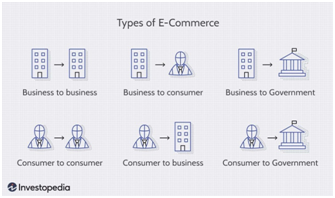Why in News?
The Department for Promotion of Industry and Internal Trade (DPIIT) on August 2 held a detailed discussion with representatives of e-commerce firms and a domestic traders’ body on the proposed policy.
Synopsis:
- The e-commerce policy was first proposed in 2018 and in 2019, a draft of the e-commerce policy was released.
- Department for Promotion of Industry and Internal Trade (DPIIT), the Ministry of Commerce and Industry emphasized the need for a streamlined regulatory framework, technological advancements, and efficient supply chain integration.
About e-Commerce:
- Electronic commerce or e-commerce is a business model that lets firms and individuals buy and sell things over the Internet.
What is e-commerce policy?
- The goal of the national e-commerce policy is to create a regulatory framework that makes doing business in the sector easier.
Key objectives

- Increasing Exports:
- The policy acknowledges India’s e-commerce sector’s significant export potential.
- It is anticipated that India’s annual e-commerce export potential will range between 200 and 300 billion USD by 2030.
- India intends to take advantage of the growth opportunity presented by cross-border e-commerce exports, which are anticipated to reach 2 trillion USD by 2025.
- FDI and the Regulatory Body:
- The chance of laying out a controller for the web based business area is being thought of, however its execution might require investment.
- Neighborhood merchants’ affiliations have been supporting an engaged administrative body to authorize online business rules and control infringement.
- Taking Care of Trader Concerns:
- Concerns have been raised by merchants regarding infractions of e-commerce regulations, such as substantial discounts and preferences granted to a select group of sellers.
- For consistency, the proposed amendments to the Consumer Protection (e-commerce) Rules 2020 will be aligned with the e-commerce policy.
- Comprehensive Methodology:
- The FDI policy, the Information Technology Act of 2000, the Competition Act of 2002, and the Consumer Protection Act of 2019 all have an impact on the sector.
- The goal of the policy is to make these rules easier to follow and make it easier for the e-commerce industry to grow.
Suggestions given by parliamentary pannel:
- Government should issue a separate e-commerce export policy. Such policies in countries including China, Korea, Japan, and Vietnam, have helped many firms sell globally.
- Redefining responsibilities of sellers; simplifying payment reconciliation and processes; developing business ecosystem; and setting up a National Trade Network for the medium.
- Pro-customer framework
- Skill development strategy – by gauging the various requirements in the e-commerce value chains.
- Proposed framing of suitable social security schemes related to insurance, working conditions, disability and other benefits by the government.
- Appropriate labour laws relating to working hours, and holidays. minimum pay, etc., for gig and platform workers, should be framed and e-commerce must be mandated to extend these.
- The committee further recommended that the DPIIT should develop appropriate mechanisms for the enforcement of rules related to Intellectual Property Rights in the e-commerce space in consultation with the relevant Ministries/Departments.
- Need to notify e-pharmacy rules and formulate comprehensive guidelines with regard to e-pharmacy/e-health platforms.
Criticism of the Draft E-Commerce Policy:
- The proposed rules infringe on other ministries’ mandates.
- For instance, the ‘fallback-liability’ clause holds platforms liable for any mis-selling by third party sellers.
- However, this runs counter to the FDI rules of the Finance Ministry — preventing platforms from explicitly managing their inventory.
- Further, it takes away the immunity granted specifically to marketplaces under the IT Act.
- Similarly, the Ministry of Corporate Affairs feels that rules related to the abuse of competitive position are unnecessary since there is already a robust Competition Commission of India that oversees such issues.
- The proposal also refrains related parties from commercial activities on platforms.
- A related party is any entity with common shareholders of over 5 per cent or more than 10 per cent ownership.
- While the motivation for this clause is noble, it won’t make any sense from a regulatory perspective.
What other e-commerce initiatives are being implemented by the Indian government?
- Launching the BharatNet project:
- Provide internet connectivity in local bodies in each Panchayat, which will build the scope and access of online business in rustic regions.
- Open Network for Digital Commerce (ONDC):
- A network that aims to democratize e-commerce and give Micro, Small, and Medium-Sized Enterprises (MSME) equal opportunities to succeed in digital commerce:
- Other government-led initiatives, such as Start Up India and Aatmanirbhar Bharat, which have the potential to become global successes, have received solid support from the Digital India initiative.
